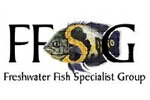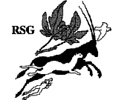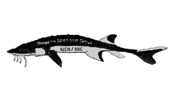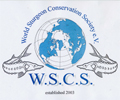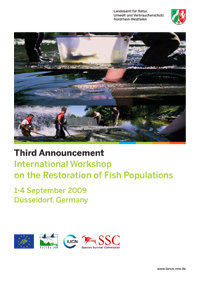
The industrial revolution in the late 18th and 19th centuries led to heavy pollution of rivers, lakes and estuaries, massive habitat degradation and the loss of many native fish species. In some countries, commercially important fisheries ceased because of overfishing and severe environmental impacts. The link between poor water quality and health and an increasing awareness of the natural environment led to a tightening of pollution legislation. However improvements in water quality were not seen till the second half of the 20th century. The first fish restoration projects commenced in the late 1960s, but it soon became apparent that restoration of fish populations is complex, lengthy and financially costly. These early fish restoration and re-introduction projects often failed due to inadequate planning and a lack of resources, financial and otherwise.
In 1988 the IUCN Re-Introduction Specialist Group was established to assist scientists and managers in conducting viable re-introduction projects worldwide. However, diadromous fish species, like salmon, sturgeon, shad or eel presented a particularly challenge because of their complex life cycles. To that end the IUCN Salmon and Sturgeon Specialist Groups were separately established to, among other things, increase the success of population conservation and habitat restoration of these commercially important species. Despite this increased effort, freshwater fish biodiversity is in general still declining in Europe and, indeed, worldwide. In response to this, the IUCN Freshwater Fish Specialist Group was established in 2004 to achieve conservation and sustainable use of all freshwater fishes and their habitats.
A considerable volume of information and expertise has been gathered over 50 years of fish restoration trials and the present conference provides an opportunity to bring together experts from all around the world to exchange experiences and technical data, to improve and optimise current fish restoration projects and to plan for the future. The key aim of this symposium is to synthesize international knowledge on fish restoration by facilitating the presentation of original research results from a number of different disciplinary fields.
Hosting the conference is the EU's "European Life Project" for the restoration of the Allis shad (Alosa alosa) to the River Rhine. This anadromous fish died out in the Rhine in the first half of the 20th century. However a project to restore the species to the Rhine was started in 2003. In 2008 the first shad were re-introduced to the river. Research data communicated during the course of this Workshop shall be used to optimise the goals of this project and several others.
Messages to Peter Beeck:
Peter Beeck
Stiftung Wasserlauf, Life Maifisch
Aquazoo Löbbecke Museum
Kaiserswerther Strasse 380
40200 Düsseldorf
Germany
phone: +49 211 8996 160
fax: +49 211 8994 493
Email: Peter.Beeck@wasserlauf-nrw.de


